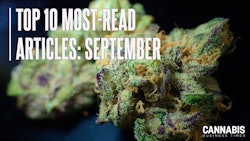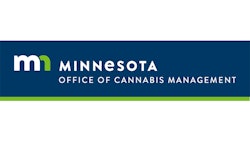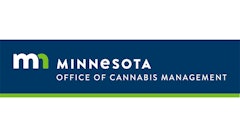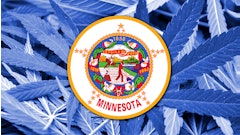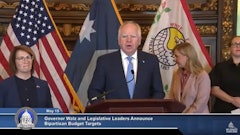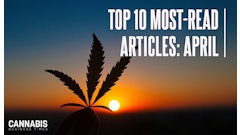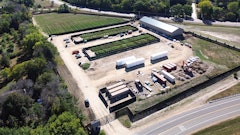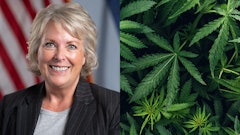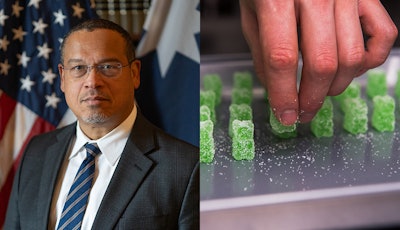
Minnesota Attorney General Keith Ellison argued that his goal was to protect the state’s hemp THC industry when he spearheaded a letter on Oct. 24 asking Congress to criminalize products containing synthetic hemp derivatives.
The letter, signed by 39 state and territorial attorneys general, asked U.S. congressional leaders to clarify the federal definition of hemp in a manner that would close a “loophole” in the 2018 Farm Bill that has allowed intoxicating hemp-derived THC products to inundate communities nationwide.
The letter did not provide a recommendation for what the new federal definition should entail, but rather, the signers asked federal lawmakers to use the appropriations process or farm bill reauthorization as a vehicle to ban products containing “intoxicating levels of THC – of any kind and no matter how it is derived.”
Five days later, on Oct. 29, Ellison said that the letter created some confusion, and he wanted to clarify why he helped orchestrate it.
“First, I am and will remain a supporter of Minnesota’s THC edible industry that follows state law, supports businesses, farmers, and entrepreneurs across Minnesota, and creates products that people enjoy,” Ellison wrote in a Substack post. “One of the primary reasons I signed onto the letter is to ensure this industry continues to thrive.”
Ellison pointed to Minnesota’s law governing edibles and beverages containing THC derived from hemp, which took effect in July 2022, before the state legalized adult-use cannabis. Under the hemp law, Minnesotans 21 and older can purchase cannabinoid products containing no more than 5 milligrams of THC per serving and 50 milligrams per package.
Also under the law, an edible cannabinoid product may contain delta-8 or delta-9 THC extracted from hemp, even if the delta-8 THC is considered an “artificially derived cannabinoid.”
“I support this law, and I am not seeking to restrict the sale of products that follow the law in any way,” Ellison wrote on Substack.
The letter that Ellison spearheaded tells a different story: That “a proper interpretation” of the 2018 Farm Bill would establish that the “entire synthetic THC industry rests on a foundation of illicit conduct.”
A footnote in the letter states that clarifying the definition of hemp in the farm bill is necessary to ensure that the federal statute aligns with the Food, Drug, and Cosmetics Act, under which any kind of THC-infused food or beverage product is unlawful.
The letter, which Ellison orchestrated with attorneys general Tim Griffin (Arkansas), William Tong (Connecticut) and Todd Rokita (Indiana), omits mentioning that a federal proposal that the Senate Appropriations Committee voted unanimously to approve in July aimed to ban hemp-derived products containing quantifiable amounts of THC or THCA.
Should that provision be included in the final appropriations bill, Minnesota’s hemp edible and beverage program would collide with a federal reworking.
In his Substack post, Ellison framed Minnesota’s cannabinoid hemp law as responsible, requiring products to be tested for safety, clearly and accurately labeled, and packaged responsibly to prevent youth consumption.
“Minnesota’s legalization of THC edibles was smart and safety-conscious, and unfortunately, the loophole created by the federal government is anything but,” he wrote. “As a result, there are highly potent THC products entering Minnesota that are being marketed to children, and I won’t stand by and let out-of-state businesses prey on young Minnesotans.”
In urging Congress to close the loophole, Ellison said he hopes that federal clarity will help prevent out-of-state companies from shipping products in interstate commerce that ignore Minnesota’s “carefully crafted THC regulations.”
While calling on Congress to act could potentially shut down Minnesota’s entire hemp THC marketplace, the state attorney general said that wasn’t his intent in crafting the letter.
Ellison indicated that he wants regulation, not prohibition.
“People across our state are enjoying THC edibles that are legally produced and sold under Minnesota law,” he wrote. “These products are made from hemp that Minnesota farmers grow and Minnesota breweries and other small businesses sell. I want this industry to continue to grow and flourish. I also want products sold in Minnesota to be safe and follow our laws. I believe that closing the loophole in the 2018 Farm Bill will accomplish both of these goals.”











